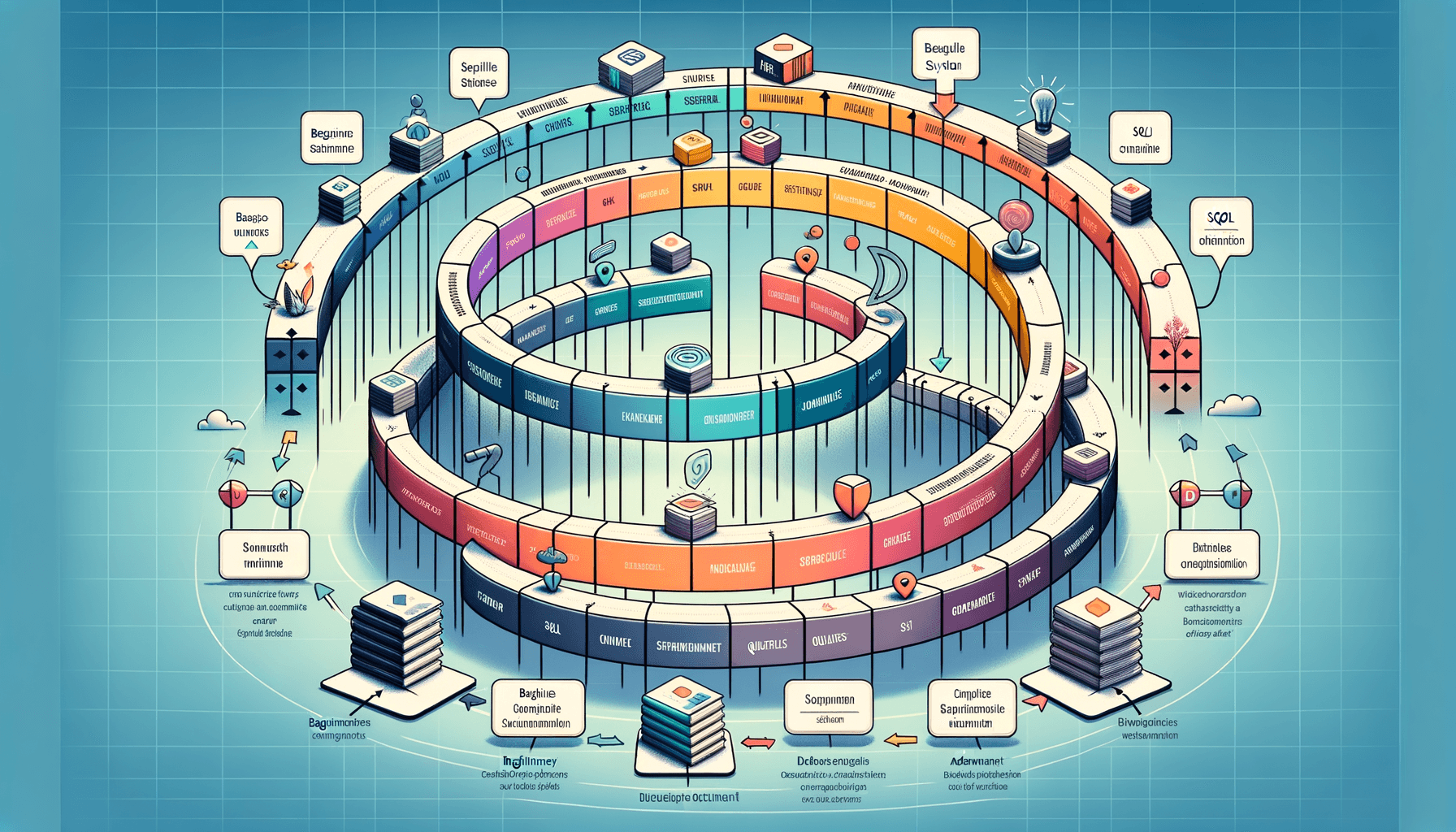A big variety of articles and resources

Exploring the Data Topic: Key Insights and Trends
 Sia Author and Instructor
Learn SQL
Sia Author and Instructor
Learn SQL
9 minute read
Data is a big part of our world today. It helps us understand many things, from health to weather. This article looks at how data has changed over time, the ways we study it, and how it is used in different fields. We will also talk about the challenges and ethical issues in data research. Finally, we will explore future trends and how to get started in a career in data research.
Key Takeaways
- Data has changed a lot over the years, and it keeps evolving.
- New technology helps us study data in better ways.
- Data is used in many fields like healthcare, finance, and environmental studies.
- There are important ethical issues to consider, like privacy and fairness.
- Learning about data can lead to many exciting career opportunities.
The Evolution of Data Topic in Modern Research
Historical Context and Milestones
The journey of data topic research has been marked by significant milestones. Initially, data collection was a manual process, often prone to errors. Over time, the introduction of computers revolutionized this field, making data collection and analysis more accurate and efficient. One key milestone was the development of relational databases, which allowed for better organization and retrieval of data.
Influence of Technological Advancements
Technological advancements have played a crucial role in shaping data topic research. The advent of big data technologies has enabled researchers to handle vast amounts of data with ease. Additionally, the rise of machine learning and artificial intelligence has opened new avenues for data analysis, making it possible to uncover patterns and insights that were previously hidden.
Current Trends in Data Topic
Today, data topic research is characterized by several emerging trends. One notable trend is the increasing use of real-time data analysis, which allows for more timely and relevant insights. Another trend is the growing emphasis on data visualization, helping researchers to present their findings in a more understandable and impactful way. Furthermore, there is a strong focus on interdisciplinary collaborations, bringing together experts from various fields to tackle complex data challenges.
As we continue to explore the evolution of data topic research, it is clear that technological advancements and emerging trends will continue to shape this dynamic field.
Methodologies in Data Topic Analysis
Quantitative vs. Qualitative Approaches
When we explore data topics, we often use two main methods: quantitative and qualitative. Quantitative methods involve numbers and statistics, helping us measure and analyze data in a structured way. On the other hand, qualitative methods focus on understanding the meaning behind the data, often through interviews or observations. Both approaches are valuable, and choosing the right one depends on the research question.
Emerging Analytical Techniques
New techniques in data analysis are constantly evolving. Machine learning and artificial intelligence are at the forefront, offering powerful tools to uncover patterns and insights. These technologies can process vast amounts of data quickly, making them indispensable in modern research. Additionally, techniques like data mining and predictive analytics are becoming more common, helping researchers make informed decisions based on trends and patterns.
Challenges in Data Topic Methodologies
Despite the advancements, there are still challenges in data topic methodologies. One major issue is data quality. Poor-quality data can lead to incorrect conclusions. Another challenge is the complexity of data, which can be difficult to manage and analyze. Researchers must also be aware of biases that can affect their results. Addressing these challenges requires careful planning and a thorough understanding of the methodologies used.
Applications of Data Topic Across Various Industries
Healthcare and Medical Research
In healthcare, data analysis helps us understand patient outcomes and improve treatments. By examining large datasets, we can identify trends and patterns that lead to better care. Data-driven insights are crucial for developing new medications and predicting disease outbreaks.
Financial Services and Market Analysis
In the financial sector, data analysis is used to predict market trends and make informed investment decisions. We can analyze stock performance, economic indicators, and consumer behavior to guide our strategies. This helps in minimizing risks and maximizing returns.
Environmental and Climate Studies
Data analysis plays a vital role in understanding environmental changes and climate patterns. By studying data from various sources, we can track pollution levels, monitor wildlife populations, and predict natural disasters. This information is essential for developing effective environmental policies and sustainable practices.
The use of data analysis across different industries highlights its importance in making informed decisions and driving innovation.
Ethical Considerations in Data Topic Research
Privacy and Data Security
In our research, we must prioritize the privacy and security of the data we handle. This means being transparent about how we collect, use, and protect data. It's crucial to follow a clear privacy policy, especially when dealing with sensitive information. We should also be aware of the potential risks and take steps to mitigate them.
Bias and Fairness in Data Analysis
Ensuring fairness in data analysis is essential. We need to be vigilant about biases that can creep into our work, whether they stem from the data itself or from our own assumptions. By actively seeking to identify and correct these biases, we can produce more reliable and equitable results.
Regulatory and Compliance Issues
Adhering to regulations and compliance standards is a fundamental aspect of ethical research. This includes understanding and following laws related to data protection and privacy. Staying informed about changes in these regulations helps us maintain the integrity of our research and protect the rights of those whose data we study.
Future Directions in Data Topic Exploration
Innovations in Data Collection
As we look ahead, new ways of gathering data are set to change the field. From advanced sensors to crowdsourcing, these methods will provide richer and more diverse datasets. This will help us understand complex issues better and make more informed decisions.
Predictive Analytics and Machine Learning
Predictive analytics and machine learning are becoming more important in data research. These tools allow us to forecast trends and behaviors with high accuracy. By using these techniques, we can solve real-world problems more effectively and improve our project readiness.
Interdisciplinary Collaborations
Working together across different fields is key to future data research. By combining knowledge from various disciplines, we can tackle complex problems in new ways. This approach will lead to more innovative solutions and a deeper understanding of the issues at hand.
The future of data research lies in our ability to innovate, predict, and collaborate. By embracing these directions, we can unlock new possibilities and drive progress in various fields.
Educational Pathways for Aspiring Data Topic Researchers
Academic Programs and Courses
For those looking to dive into the world of data research, there are many academic programs available. Universities offer degrees in data science, statistics, and computer science. These programs provide a solid foundation in both theory and practical skills. For example, a data analyst - introduction to SQL course offers beginner-friendly SQL training for aspiring data analysts, junior data analysts, marketing analysts, and business analysts. Gain practical skills for real-world data analysis.
Professional Certifications
In addition to academic degrees, professional certifications can boost your credentials. Certifications like Certified Data Professional (CDP) and Microsoft Certified: Azure Data Scientist Associate are highly valued in the industry. These certifications often require passing exams and demonstrating hands-on experience.
Skill Development and Training Opportunities
Continuous learning is key in the ever-evolving field of data research. Online platforms like Coursera and edX offer courses that help you stay updated with the latest trends and technologies. Workshops and bootcamps are also great for gaining practical experience. Skill development is crucial for staying competitive in this field.
The journey to becoming a data topic researcher is filled with opportunities for learning and growth. Whether through formal education or self-paced learning, the key is to stay curious and keep exploring new avenues.
Are you dreaming of becoming a top data researcher? Our educational pathways can help you get there! We offer a variety of courses designed to boost your skills and knowledge in data science. Whether you're just starting out or looking to advance your career, we have something for everyone. Don't wait any longer to start your journey. Visit our website today to explore our course catalog and find the perfect fit for you!
Conclusion
In summary, exploring the data topic has revealed several important insights and trends. We have seen how data impacts various fields and how it can be used to make better decisions. The trends show that data is becoming more important in our daily lives. As technology advances, the role of data will continue to grow. Understanding these trends can help us prepare for the future and make the most of the opportunities that data offers. By staying informed and adapting to changes, we can use data to improve our world.
Frequently Asked Questions
What is the history of the data topic?
The data topic has evolved over time, starting from simple data collection methods to advanced techniques using technology. Key milestones include the introduction of computers and the internet, which revolutionized how data is gathered and analyzed.
How has technology influenced data topic research?
Technology has greatly impacted data topic research by making it easier to collect, store, and analyze large amounts of data. Tools like computers, software, and the internet have all played a big role.
What are the current trends in data topic research?
Some current trends include the use of big data, machine learning, and predictive analytics. Researchers are also focusing on real-time data analysis and data visualization techniques.
What are the main methods used in data topic analysis?
The main methods are quantitative and qualitative approaches. Quantitative methods focus on numbers and statistics, while qualitative methods look at descriptions and themes.
What ethical issues are there in data topic research?
Ethical issues include concerns about privacy, data security, and avoiding bias in data analysis. Researchers must also follow regulations and laws to ensure their work is ethical.
What skills are needed to become a data topic researcher?
To become a data topic researcher, you need skills in data collection and analysis, knowledge of statistical methods, and the ability to use data analysis software. Good problem-solving skills and attention to detail are also important.







